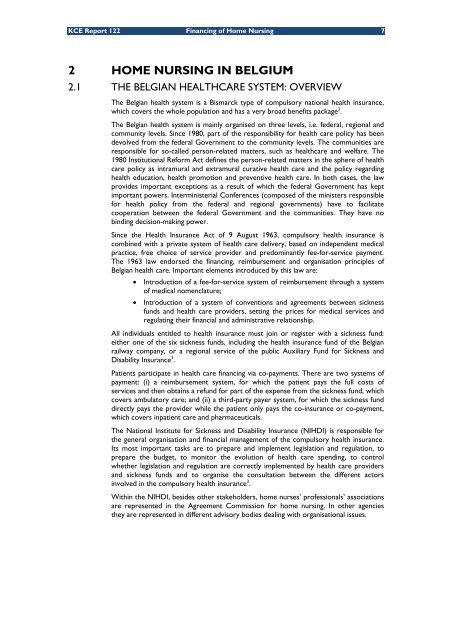Le financement des soins infirmiers à domicile en Belgique - KCE
Le financement des soins infirmiers à domicile en Belgique - KCE
Le financement des soins infirmiers à domicile en Belgique - KCE
You also want an ePaper? Increase the reach of your titles
YUMPU automatically turns print PDFs into web optimized ePapers that Google loves.
<strong>KCE</strong> Report 122 Financing of Home Nursing 7<br />
2 HOME NURSING IN BELGIUM<br />
2.1 THE BELGIAN HEALTHCARE SYSTEM: OVERVIEW<br />
The Belgian health system is a Bismarck type of compulsory national health insurance,<br />
which covers the whole population and has a very broad b<strong>en</strong>efits package 3 .<br />
The Belgian health system is mainly organised on three levels, i.e. federal, regional and<br />
community levels. Since 1980, part of the responsibility for health care policy has be<strong>en</strong><br />
devolved from the federal Governm<strong>en</strong>t to the community levels. The communities are<br />
responsible for so-called person-related matters, such as healthcare and welfare. The<br />
1980 Institutional Reform Act defines the person-related matters in the sphere of health<br />
care policy as intramural and extramural curative health care and the policy regarding<br />
health education, health promotion and prev<strong>en</strong>tive health care. In both cases, the law<br />
provi<strong>des</strong> important exceptions as a result of which the federal Governm<strong>en</strong>t has kept<br />
important powers. Interministerial Confer<strong>en</strong>ces (composed of the ministers responsible<br />
for health policy from the federal and regional governm<strong>en</strong>ts) have to facilitate<br />
cooperation betwe<strong>en</strong> the federal Governm<strong>en</strong>t and the communities. They have no<br />
binding decision-making power.<br />
Since the Health Insurance Act of 9 August 1963, compulsory health insurance is<br />
combined with a private system of health care delivery, based on indep<strong>en</strong>d<strong>en</strong>t medical<br />
practice, free choice of service provider and predominantly fee-for-service paym<strong>en</strong>t.<br />
The 1963 law <strong>en</strong>dorsed the financing, reimbursem<strong>en</strong>t and organisation principles of<br />
Belgian health care. Important elem<strong>en</strong>ts introduced by this law are:<br />
• Introduction of a fee-for-service system of reimbursem<strong>en</strong>t through a system<br />
of medical nom<strong>en</strong>clature;<br />
• Introduction of a system of conv<strong>en</strong>tions and agreem<strong>en</strong>ts betwe<strong>en</strong> sickness<br />
funds and health care providers, setting the prices for medical services and<br />
regulating their financial and administrative relationship.<br />
All individuals <strong>en</strong>titled to health insurance must join or register with a sickness fund:<br />
either one of the six sickness funds, including the health insurance fund of the Belgian<br />
railway company, or a regional service of the public Auxiliary Fund for Sickness and<br />
Disability Insurance 3 .<br />
Pati<strong>en</strong>ts participate in health care financing via co-paym<strong>en</strong>ts. There are two systems of<br />
paym<strong>en</strong>t: (i) a reimbursem<strong>en</strong>t system, for which the pati<strong>en</strong>t pays the full costs of<br />
services and th<strong>en</strong> obtains a refund for part of the exp<strong>en</strong>se from the sickness fund, which<br />
covers ambulatory care; and (ii) a third-party payer system, for which the sickness fund<br />
directly pays the provider while the pati<strong>en</strong>t only pays the co-insurance or co-paym<strong>en</strong>t,<br />
which covers inpati<strong>en</strong>t care and pharmaceuticals.<br />
The National Institute for Sickness and Disability Insurance (NIHDI) is responsible for<br />
the g<strong>en</strong>eral organisation and financial managem<strong>en</strong>t of the compulsory health insurance.<br />
Its most important tasks are to prepare and implem<strong>en</strong>t legislation and regulation, to<br />
prepare the budget, to monitor the evolution of health care sp<strong>en</strong>ding, to control<br />
whether legislation and regulation are correctly implem<strong>en</strong>ted by health care providers<br />
and sickness funds and to organise the consultation betwe<strong>en</strong> the differ<strong>en</strong>t actors<br />
involved in the compulsory health insurance 3 .<br />
Within the NIHDI, besi<strong>des</strong> other stakeholders, home nurses’ professionals’ associations<br />
are repres<strong>en</strong>ted in the Agreem<strong>en</strong>t Commission for home nursing. In other ag<strong>en</strong>cies<br />
they are repres<strong>en</strong>ted in differ<strong>en</strong>t advisory bodies dealing with organisational issues.

















